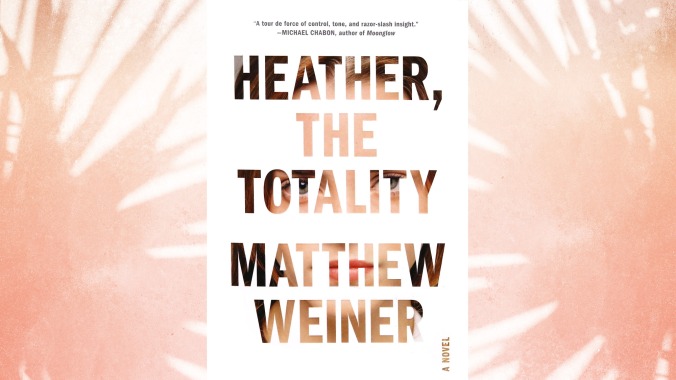The first novel from Mad Men creator Matthew Weiner is perplexingly bad

The Heather of Heather, The Totality is the daughter of Mark and Karen Breakstone, an unhappily married couple originally drawn together by his stability and her beauty. (She is “glaringly mismatched to his ugliness.”) Despite her parents’ loveless marriage, Heather grows up to be an intelligent and precocious child, able to reduce grown women to tears on the subway with her youthful insights, and an expert wielder of the emotional shiv against her mother. She also grows up beautiful, and as a teenager attracts the dangerous and very adult attention of Bobby, a newly released convict who develops an obsession with the girl while renovating the Breakstone’s brownstone.
This is the set-up to the peculiar first novel by Mad Men creator Matthew Weiner. Peculiar because its most obvious flaws, which reinforce the sense that it is an undercooked and tossed-off experiment, were clearly by design. Heather is written almost like an epic prose poem, with every incident, thought, or description confined to a micro-paragraph, with a hundred or so of these composing each of the five short chapters (the whole book can be read in the span of about an hour). Throughout the entire book there’s scarcely a single exchange of dialogue, where one person says someone and someone else responds. Calling it sparse would be an understatement.
The stylistic and thematic forebears seem to be Richard Yates and John Cheever, —and also Weiner’s touchstones for the story of Don Draper—although neither of them were ever this awkwardly pulpy, and Weiner’s Raymond Carver-on-crack style (which is to say, Raymond Carver on sedatives) reads like minimalistic realism stretched to the point of parody.
This is all in contrast to something like After The Fall, another recent example of a showrunner (Fargo’s Noah Hawley) turning to novels from novelistic series. That book, whatever its flaws, bore the fingerprint of its creator with distinct characters and focused plotting. Were one to write out a list of attributes that defined Mad Men—nuance, subtlety, complexity of character, an ability to convey its people and its setting through small gestures and details—Heather is the antithesis of that list. This is so completely true that it has to have been a deliberate decision, even if it wasn’t a successful one.
Here’s a small example of the book’s approach to its characters: Heather and Mark develop a routine of having their morning coffee together. Karen, jealous of their bond, gifts them a fancy new machine, “too dangerous for Heather to use and too complicated for Mark and since she was the only one who had seen the demonstration, she could and would make their coffee from now on.” There’s insight here: Karen, stung, is trying to shoehorn herself into the only happy relationship of the family. It’s easy to think of Mad Men totems that served similar functions as the coffeemaker — remember the chip-n-dip?—but here the scene is so abrupt and obvious that it’s hard to take seriously.
All this said, Weiner does have an innate understanding of how people, especially aimless well-to-do wealthy people, get trapped into ruts and cycles. The story of the Breakstones by themselves would make for a perfectly serviceable New Yorker story. It’s the addition of Bobby that destroys much of what Weiner would otherwise accomplish (and single-handedly lets it reach novella length).
Bobby is the most black-and-white character Weiner has ever written, a pure villain, however pathetic. Serving time for assault, he decides he should have killed his victim to eliminate the witness, while at the same time reflecting that he was lucky: the woman was too drunk to remember he had been out to rape her, so that wasn’t among his charges.
The whole story goes by so abruptly that one can’t really say it builds to a confrontation, but the characterization here simplifies the narrative to the point that Weiner essentially ends up saying nothing. Heather reads like the outline to another story, one that would probably be effective, if it had the Mad Men attention to detail. If this is just him clearing his throat ahead of The Romanoffs, then what he says there will hopefully be worth hearing.
For a place to discuss the ending we don’t reveal here, head over to The Last Page.
Purchasing Heather, The Totality via Amazon helps support The A.V. Club.